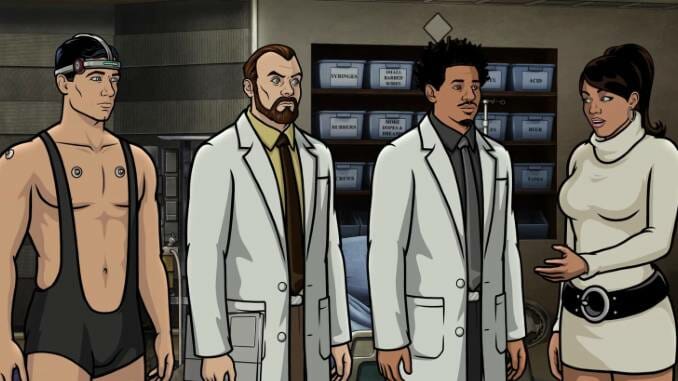After 12 Seasons, Archer Has Lost Its Way

Archer is a show consciously and intrinsically about the search for identity. This theme is textual and subtextual, it is constant and continuous. Creator Adam Reed, his creative team, and the other voice actors found that identity long ago. But they’re not growing anymore, and that’s a problem.
The show’s focus on identity begins and ends with the titular protagonist, Sterling Archer (H. Jon Benjamin, “Codename: Duchess”), a profoundly selfish, deeply lonely, womanizing alcoholic with an inability to stay on-task. His begrudging growth, or fleeting moments of clarity, made him likeable as a character, if not a person. A recurring plot arc and personal conflict of the early seasons was Archer trying to discover his father’s true identity, possibly the head of the KGB or rival spy agency ODIN. Eventually the show stopped caring about that, though, stripping it of one of its more affecting and human threads, and that’s emblematic of how the show as a whole has regressed over the years. At least this season’s touching send-off for the late Jessica Walter made sure to reference her character Ms. Mallory Archer’s “many lovers, who are literally numerous.”
“Dingo Baby, Etc,” the third-to-last episode of this latest season, gave some insight into how Archer became the selfish lout he is, showing emotional depth that was otherwise missing in a season that could have used more heart. The show, or its creators, seem bored, lacking either creative ambition or adequate space to grow. Archer’s characters once grappled and evolved, but now seem stuck doing what they’ve always done, which seems less charming because they’re no longer exploring new spaces.
The reference-filled adult spy cartoon comedy has changed its settings and its adversaries while its characters mostly maintain the same modus operandi. They’ve been to space, the bottom of the ocean, inside the human body, and back, all before we even got stuck in Archer’s head during a three-year coma. They’ve even made the most dangerous move of all, from FX to its offshoot FXX, following and perpetuating a drop-off in viewership ratings. During that time its seasons have grown shorter, going from a 10-episode premiere season to five straight 13-episode seasons, winding back down to 10, and has now had five straight seasons with eight or nine episodes.
Some TV shows don’t get enough time to breathe. A thought I found myself having midway through the most recent season of Netflix’s Sex Education occurred to me during the last two episodes of Archer: the show needs more time. Eight episodes is not enough to dig into these characters and this setting the way Archer used to, especially with episodes only running between 19 and 24 minutes. After all these years, especially as the show and its fans are saying goodbye to Jessica Walter, it isn’t enough time.
And yet, 12 seasons through, it very much feels like Archer has said all it has to say. After the fourth season, our gang of spies became witless drug dealers in Archer: Vice, an adventure that eventually turned into a retrospective and critique on U.S. foreign policy in Latin America. Briefly returning to the world of covert espionage as CIA subcontractors (no longer using the name ISIS because of real-world connotations), season six ended with a two-part riff on Fantastic Voyage, a mission that goes disastrously wrong, setting the team up to become a private detective agency in season seven. That season ended with Sterling going into a coma, leading to three anthology seasons. There was Archer: Dreamland, set in a prohibition noir mirage where Archer has to solve the murder of Woodhouse (his real-life manservant turned fantasy detective partner), dedicated to the memory of George Coe, who played Woodhouse and passed in 2015. Then there was “Danger Island,” set in the late 1930s in the South Pacific inspired by old adventure serials and remarking on the interwar period. This was followed by Archer: 1999, a sci-fi space adventure that apes the aesthetics of Alien, among other speculative fiction and space fantasy. That ends with Archer awaking from his coma to learn his daughter with fellow field agent Lana Kane (Aisha Tyler) is being raised by her alongside her new husband, an older, richer man. Perhaps turning three straight seasons into extended dream sequences was a sign that the creators’ creative well was running dry.